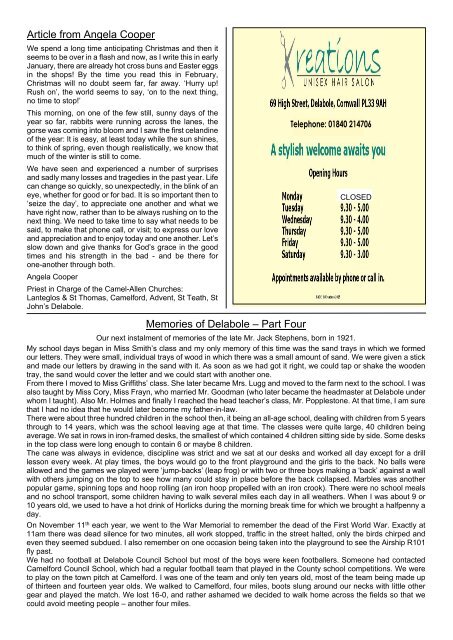Create successful ePaper yourself
Turn your PDF publications into a flip-book with our unique Google optimized e-Paper software.
Article from Angela Cooper<br />
We spend a long time anticipating Christmas and then it<br />
seems to be over in a flash and now, as I write this in early<br />
January, there are already hot cross buns and Easter eggs<br />
in the shops! By the time you read this in <strong>Feb</strong>ruary,<br />
Christmas will no doubt seem far, far away. ‘Hurry up!<br />
Rush on’, the world seems to say, ‘on to the next thing,<br />
no time to stop!’<br />
This morning, on one of the few still, sunny days of the<br />
year so far, rabbits were running across the lanes, the<br />
gorse was coming into bloom and I saw the first celandine<br />
of the year: It is easy, at least today while the sun shines,<br />
to think of spring, even though realistically, we know that<br />
much of the winter is still to come.<br />
We have seen and experienced a number of surprises<br />
and sadly many losses and tragedies in the past year. Life<br />
can change so quickly, so unexpectedly, in the blink of an<br />
eye, whether for good or for bad. It is so important then to<br />
‘seize the day’, to appreciate one another and what we<br />
have right now, rather than to be always rushing on to the<br />
next thing. We need to take time to say what needs to be<br />
said, to make that phone call, or visit; to express our love<br />
and appreciation and to enjoy today and one another. Let’s<br />
slow down and give thanks for God’s grace in the good<br />
times and his strength in the bad - and be there for<br />
one-another through both.<br />
Angela Cooper<br />
Priest in Charge of the Camel-Allen Churches:<br />
Lanteglos & St Thomas, Camelford, Advent, St Teath, St<br />
John’s <strong>Delabole</strong>.<br />
Telephone: 01840 214706<br />
CLOSED<br />
Memories of <strong>Delabole</strong> – Part Four<br />
Our next instalment of memories of the late Mr. Jack Stephens, born in 1921.<br />
My school days began in Miss Smith’s class and my only memory of this time was the sand trays in which we formed<br />
our letters. They were small, individual trays of wood in which there was a small amount of sand. We were given a stick<br />
and made our letters by drawing in the sand with it. As soon as we had got it right, we could tap or shake the wooden<br />
tray, the sand would cover the letter and we could start with another one.<br />
From there I moved to Miss Griffiths’ class. She later became Mrs. Lugg and moved to the farm next to the school. I was<br />
also taught by Miss Cory, Miss Frayn, who married Mr. Goodman (who later became the headmaster at <strong>Delabole</strong> under<br />
whom I taught). Also Mr. Holmes and finally I reached the head teacher’s class, Mr. Popplestone. At that time, I am sure<br />
that I had no idea that he would later become my father-in-law.<br />
There were about three hundred children in the school then, it being an all-age school, dealing with children from 5 years<br />
through to 14 years, which was the school leaving age at that time. The classes were quite large, 40 children being<br />
average. We sat in rows in iron-framed desks, the smallest of which contained 4 children sitting side by side. Some desks<br />
in the top class were long enough to contain 6 or maybe 8 children.<br />
The cane was always in evidence, discipline was strict and we sat at our desks and worked all day except for a drill<br />
lesson every week. At play times, the boys would go to the front playground and the girls to the back. No balls were<br />
allowed and the games we played were ‘jump-backs’ (leap frog) or with two or three boys making a ‘back’ against a wall<br />
with others jumping on the top to see how many could stay in place before the back collapsed. Marbles was another<br />
popular game, spinning tops and hoop rolling (an iron hoop propelled with an iron crook). There were no school meals<br />
and no school transport, some children having to walk several miles each day in all weathers. When I was about 9 or<br />
10 years old, we used to have a hot drink of Horlicks during the morning break time for which we brought a halfpenny a<br />
day.<br />
On November 11 th each year, we went to the War Memorial to remember the dead of the First World War. Exactly at<br />
11am there was dead silence for two minutes, all work stopped, traffic in the street halted, only the birds chirped and<br />
even they seemed subdued. I also remember on one occasion being taken into the playground to see the Airship R101<br />
fly past.<br />
We had no football at <strong>Delabole</strong> Council School but most of the boys were keen footballers. Someone had contacted<br />
Camelford Council School, which had a regular football team that played in the County school competitions. We were<br />
to play on the town pitch at Camelford. I was one of the team and only ten years old, most of the team being made up<br />
of thirteen and fourteen year olds. We walked to Camelford, four miles, boots slung around our necks with little other<br />
gear and played the match. We lost 16-0, and rather ashamed we decided to walk home across the fields so that we<br />
could avoid meeting people – another four miles.

















